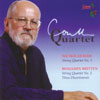Britten; Maw String Quartets
More Maw would have made this ideal but the pairing is outstanding
View record and artist detailsRecord and Artist Details
Composer or Director: Benjamin Britten, (John) Nicholas Maw
Genre:
Chamber
Label: Céleste Series
Magazine Review Date: 10/2007
Media Format: CD or Download
Media Runtime: 60
Mastering:
Stereo
DDD
Catalogue Number: SOMMCD065

Tracks:
| Composition | Artist Credit |
|---|---|
| String Quartet No 3 |
(John) Nicholas Maw, Composer
(John) Nicholas Maw, Composer Coull Quartet |
| String Quartet No. 3 |
Benjamin Britten, Composer
Benjamin Britten, Composer Coull Quartet |
| (3) Divertimentos |
Benjamin Britten, Composer
Benjamin Britten, Composer Coull Quartet |
Author: Arnold Whittall
The Coull Quartet have often played Nicholas Maw’s Third Quartet since giving its premiere in 1995, and this recording – in exceptionally lucid sound – testifies to their mastery of its tricky technical details and their sensitivity to its expressive character.
It begins in a spirit of restless lyricism which builds compellingly, eloquence and drama intensifying in ways which place the music firmly in the tradition of Berg and Bartók without any hint of abject dependency. The work is crowned by a concluding passacaglia which creates tension from the superimposition of contrasting layers of texture before reaching a climax with a unison line for all four players, a moment of revelation which subsides into a regretful resolution.
The chordal material at the end hints at the opening of Maw’s later opera Sophie’s Choice, and this is one reason why the ideal coupling for the quartet would have been the recent string sextet in which Maw uses material from the opera. The sextet probably wasn’t complete when this recording was planned, however, and the Coull have chosen a quartet, Britten’s Third, which has certain stylistic and formal features in common with Maw’s.
It begins in a spirit of restless lyricism which builds compellingly, eloquence and drama intensifying in ways which place the music firmly in the tradition of Berg and Bartók without any hint of abject dependency. The work is crowned by a concluding passacaglia which creates tension from the superimposition of contrasting layers of texture before reaching a climax with a unison line for all four players, a moment of revelation which subsides into a regretful resolution.
The chordal material at the end hints at the opening of Maw’s later opera Sophie’s Choice, and this is one reason why the ideal coupling for the quartet would have been the recent string sextet in which Maw uses material from the opera. The sextet probably wasn’t complete when this recording was planned, however, and the Coull have chosen a quartet, Britten’s Third, which has certain stylistic and formal features in common with Maw’s.
Discover the world's largest classical music catalogue with Presto Music.

Gramophone Digital Club
- Digital Edition
- Digital Archive
- Reviews Database
- Full website access
From £8.75 / month
Subscribe
Gramophone Full Club
- Print Edition
- Digital Edition
- Digital Archive
- Reviews Database
- Full website access
From £11.00 / month
Subscribe
If you are a library, university or other organisation that would be interested in an institutional subscription to Gramophone please click here for further information.




